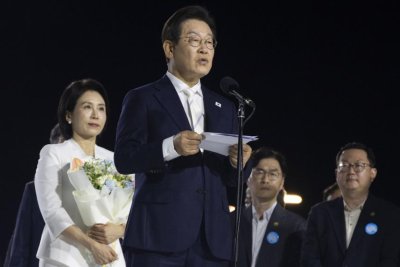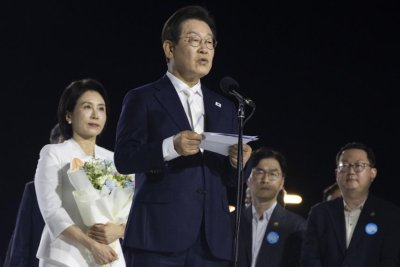
South Korean President Lee Jae-Myung speaks after receiving letters of appointment during a “people’s appointment ceremony,” which is essentially the inauguration ceremony, at Gwanghwamun square in Seoul on Friday. Photo by Jeon Heon-kyun/Pool/EPA
SEOUL, Aug. 20 (UPI) — On the 80th anniversary of Korea’s liberation from Japanese colonial rule, two voices offered radically different interpretations of what a vision for the peninsula should look like. One seeks accommodation with permanent division; the other proclaims unification as a historic calling.
In his Liberation Day address, President Lee Jae Myung departed from the long tradition of framing the national destiny around reunification. He declared:
“Liberation Day is not only a holiday for the South; it is also a day the North celebrates. … We will recognize the North’s system and will not interfere in its internal affairs.”
By effectively endorsing a “two-state” reality, Lee signaled that his administration would accept permanent division so long as Pyongyang demanded it. For critics, this was nothing less than an abdication of the historical mission of unification, one that independence fighters saw as inseparable from liberation itself.
The dissonance deepened later that evening, when Lee presided over what was billed as a “people’s inauguration” in Gwanghwamun. The spectacle was less a unifying celebration than a partisan rally, capped by his controversial pardons of political allies.
The controversy over Lee’s Liberation Day pardons was sharpened by the identities of those he chose to absolve.
Cho Kuk, a former justice minister, was convicted of academic fraud and abuse of power stemming from efforts to secure elite university placements for his daughter.
Yoon Mee-hyang, a former lawmaker and activist, was indicted on charges of embezzling funds from a civic group that supported surviving “comfort women” –Korean women forced into sexual slavery by the Japanese military during World War II.
For many citizens, forgiving such figures on a day meant to honor national sacrifice and liberation struck a jarring note.
A day earlier, on Thursday, another vision had been articulated before an international audience in Seoul. Hyun Jin Preston Moon, chairman of the Global Peace Foundation, framed Korea’s division as a foreign construct that could — and must — be overcome.
“Thus, the division of the peninsula was a ‘foreign construct’ that had nothing to do with the aspirations of the Korean people and their movement for independence and self-determination,” he said. “Their dreams and aspirations were brushed aside like a sacrificial pawn on the global chessboard of great powers seeking to shape the future of Northeast Asia.”
Moon emphasized that North Korea itself already has abandoned unification as a national goal, underscoring the bankruptcy of the regime’s vision.
“The world should view the DPRK’s efforts … as a feeble effort to gain global legitimacy in pursuing a permanent two-state solution on the peninsula. The only real path to denuclearization is the peaceful unification of the two Koreas,” he said.
Rather than clinging to a Cold War framework, Moon called on Koreans to recover their ancient mandate of Hongik Ingan — “to live for the benefit of humanity.” He presented the Korean Dream as a unifying vision capable of renewing national identity, overcoming economic and demographic crises, and inspiring the world.
“The vision for this new age is the Korean Dream. It will not only engender a rebirth of Korean culture and historical heritage, but reconnect all Koreans to the providential calling of our people rooted in our founding ideals,” Moon said.
The Korean Dream, he argued, transcends left-right ideological divides by grounding itself in Korea’s history and in universal values. It offers a framework not only to heal the wounds of division, but also to address the internal crises facing both North and South — from the South’s demographic collapse and overreliance on export-driven conglomerates to the North’s political repression, poverty and isolation. By providing a common vision that speaks to both sides of the 38th parallel, it holds the potential to overcome obstacles that ideology and power politics have failed to resolve.
Concluding his address, Moon underscored the gravity of the moment:
“We live at a historic crossroads in a time when the fate of the peninsula and our people lie in our hands. … I believe that divine providence is guiding us to undo the mistakes of the past and lead our people to the promised land of unification centered upon the Korean Dream.”
A shifting global order
Korea today stands at a decisive inflection point. The U.S.-led liberal order that shaped the post-Cold War era is being remade. Under President Donald Trump, Washington has reasserted economic nationalism, redrawing trade rules and demanding fairer burden-sharing from allies.
For a nation like South Korea, where exports account for nearly half of gross domestic product, U.S. tariffs and global supply-chain realignments strike at the heart of its economic model. At the same time, China’s slowdown and mounting confrontation with the United States leave Seoul with shrinking room to maneuver.
Compounding these external pressures is an internal crisis: the world’s lowest fertility rate, the erosion of the traditional family structure and an export-driven economy still dominated by a handful of conglomerates. Without a new animating vision, Korea risks demographic decline, economic stagnation and growing irrelevance in the face of global upheaval.
Beyond old ideologies
Against this backdrop, Lee’s decision to legitimize permanent division appears out of step with the scale of the challenges. It reflects the lingering habits of South Korea’s progressive camp — approaching the North through a lens of coexistence while ignoring the deeper shifts transforming the international system.
Yet, what Korea needs today is not an outdated ideological posture, but a forward-looking national purpose that can unite its people, rally allies and meet a rapidly changing world.
The Korean Dream offers such a vision. It ties the nation’s destiny not to resignation or division, but to renewal — a chance to overcome historical wounds, restore national unity and provide a model of reconciliation for the world.
Eighty years after liberation, the true vision for the Korean people remains contested. Whether Korea’s future is defined by resignation to division or by a bold embrace of unification will determine not only its national destiny, but also its standing in the world.
